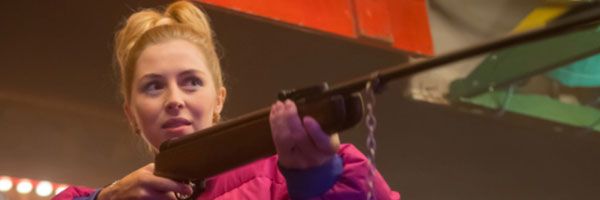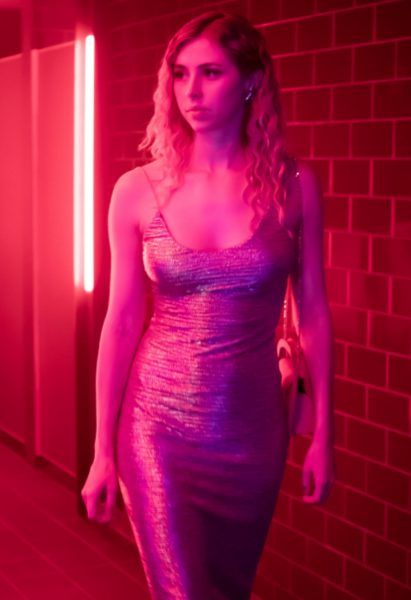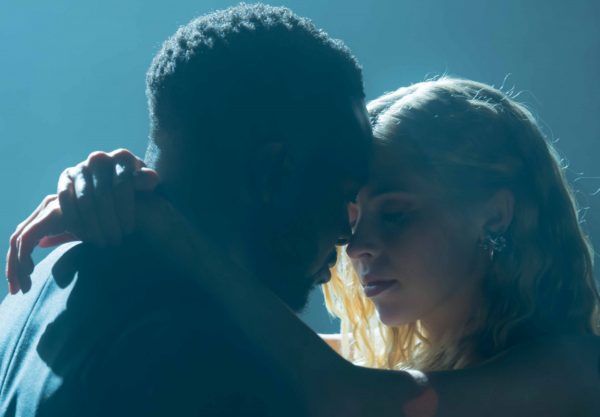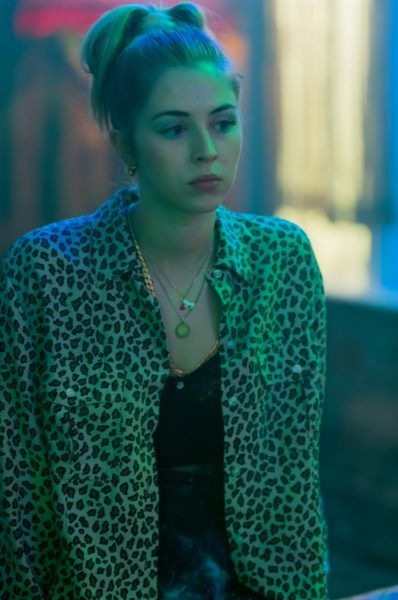[Editor's note: The following contains spoilers through the Season 1 finale of We Hunt Together.]
The six-episode drama series We Hunt Together (from BBC Studios and currently airing on Showtime) is a fascinating cat-and-mouse story that explores the relationship between a pair of deadly killers and the detectives (Eve Myles, Babou Ceesay) trying to track them down. While Freddy (Hermione Corfield) and Baba (Dipo Ola) find solace in each other, the violence they cause and the emotional manipulation that occurs leads to dangerous consequences.
During this 1-on-1 phone interview with Collider, Hermione Corfield talked about playing a character who’s such a chameleon, how Freddy views herself and her actions, having to find things she liked about such a tricky individual, exploring a love story when half of that relationship has definite sociopathic tendencies, not playing the damsel in distress, how she feels about where the story ends, and what she looks for in a project and character.
Collider: When this came your way, how much of it did you get to read? How much of this character were you made aware of, from the beginning?
HERMIONE CORFIELD: Yeah. When I was first reading it, I only read maybe the first few episodes. I don’t think I was able to read the entire series. You dig more into her backstory, from Episode 4 onwards. You get her persona, at the beginning. Because she’s a chameleon and a hustler, she shape shifts with every situation that she finds herself in. The side that I got to see was her performative, playful side, working in the phone center, taking the calls. That was the side of her that I first saw. And then, when you get to know her, she shifts into this underlying narcissistic arrogance. As you learn more about her backstory, you learn about her vulnerabilities and the unreliable narrative she’s got going in her own mind.
How do you think someone from the outside looking in would describe her, and how do you think that compares to how she would describe herself?
CORFIELD: I think she would describe herself, as being a person that’s basically above others. She’s got such a solid sense of who she is, but her actions are not what we would perceive to be as right or moral. I think she’s see herself as being a person above others. She believes she’s superior, with a superior knowledge and understanding of the world. And I think she sees her actions to be completely right. She sees herself doing the right thing. Her mind is completely different from everyone else’s. She thinks in an entirely different way and she’s wired in a different way. People definitely buy into her charm. Her boss and sometimes the police buy into her, a little bit. She has so many different sides and edges to her. Some people see her as a charming and magnetic person to be around. And then for others, if you get on her bad side, she’s a murderous person.
How challenging is a character like this to explore? Is she someone where it feels like you could always just keep digging deeper and never fully understand her?
CORFIELD: Yeah, definitely. She really believes her truth so vehemently. She’s got her own manual for how to live her life. There are no boundaries to her actions. So, as she goes through life, she’s continuously working out what she can do and what she can get away with. When it came to exploring her, there were no bounds. Once you get to the end of the series, there’s definitely a sense of how she’s become who she is. Obviously, there’s nature and nurture, and that was so fascinating to explore and figure out how much of that was just herself, within herself, and how much of it was external factors.
Actors always talk about not wanting to judge their characters, but it seems like it’s hard to not form an opinion on someone like her. Were you still able to withhold judgement on this character?
CORFIELD: I definitely had to find things that I really liked about her. You have to like your characters. I found her really liberating to play, in that she’s completely unafraid. I think her fearlessness, and her direct and unapologetic way of getting what she wants, are things that I learned to like about her. There were definitely moments, with her manipulative tendencies, that I found it hard to be empathetic towards her. I had to find a core of her that I did like, and I think that was the fearlessness, unapologetic attitude, and her ability to get whatever she wants.
When you’re playing someone that has sociopathic tendencies, does it make it even more challenging to explore a love story, when half of that relationship can’t really fall in love with someone else?
CORFIELD: Yeah. That was a really interesting element. What we concluded, which is also what’s explored in the series, is that she really, really wants to love. That’s so important, in the character. She really wants that for herself, and she wants to love him, so desperately, but she just can’t because her brain is wired differently. As much as she wants that, so desperately, she can’t make it happen. Through the whole series, she’s really trying to emulate what she understands to be love. She thinks Baba is her soulmate. She really does feel like he’s the missing part in her life, just in a less conventional way than we might see that.
When they meet, she really starts trying to mold him into that, from the moment they meet each other. Do you feel like that was genuinely who he is? Was it her manipulation that got him to that place, or do you think he would have gotten there eventually, himself?
CORFIELD: No, I think she was the catalyst that caused him to go back into a life of violence. In another world, he would have continued going to church and he would have been on a straight path to being in the UK and working and having a normal life. I think she exploded into his life, in the same way that he exploded into hers, but she definitely looks to bring out that violence in him. She sees something in him that can be the missing piece to her life. I do think that she’s the reason that he enters back into that life.
What did you enjoy about exploring the dynamic between Freddy and Baba? What was it like to explore that energy with your co-star, Dipo Ola?
CORFIELD: It was really great. Dipo and I would chat a lot about it, particularly in terms of what makes him carry out the violent action. He really has to love her, and feel this love and this draw to her, to be able to carry out such a violent crime. So, we really talked about that and about making sure that there’s this palpable chemistry between them. Me and Dipo became friends with this, and we had mutual friends before, so that was a nice place to start. We had to make sure that there was a real draw to each other ‘cause otherwise, you can’t buy into the fact that he’s doing all of these terrible things.
It’s an interesting journey to watch a pair of killers versus a pair of detectives that are pursuing them. What did you enjoy about those parallel dynamics, as they try to get into each other’s head?
CORFIELD: Yeah, I agree. I don’t think it’s been done before like that, and that’s what makes it interesting and unique. And also, you’re going along with the killers. You’re carrying out the killings with them. You’re not guessing what’s happening. You know what’s happened, and you’re following along, like a bystander.
Was there also something refreshing about getting to play against that damsel in distress trope?
CORFIELD: Definitely, it was refreshing to have that dynamic, and also to play a villain, as well. I don’t think I’ve ever been cast as someone this murderous before, and that was refreshing, looking into someone’s mind that has the ability to carry out those things. She does wield a lot of power over Baba. There is a shifting power dynamic between them, but I think that she does tend to be dominant, and that tone is set, from the beginning. She does behave like she’s a queen. She goes about her life, getting what she wants.
Is she someone who has her own code that she follows, or is she just about what’s best for her?
CORFIELD: I think it’s more about what’s best for her. She has a set of ideas for what she thinks about life and the way the world operates, but she goes about getting what she wants and what she can get from any scenario. She can do whatever she wants, and she does, to get away with it.
How do you feel about where the story ends for Freddy? Did it surprise you? Did it feel like a fitting way to end her story, at the end of the season?
CORFIELD: I love the fact of her, riding off into the sunset on the next adventure, wherever that’s going to be. That’s symbolic of the way she goes about life. She jumps from one scenario to the next, unscathed, or as unscathed as she can. Her ability to work her way out of that situation is extraordinary and just shows the power of her manipulation.
There been any conversation or discussion about doing another season of this series?
CORFIELD: I think there’s talk of it. I don’t know if it’s 100 percent going ahead yet. I haven’t been told that. But where it leaves it, it could go either way. It could be the end and off she goes, and who knows what happened, or it could lead nicely into another season.
Have you thought about where you go from here and what you’re looking for, when it comes to what you want to do next?
CORFIELD: I love this job so much because you don’t know what’s coming next. You never know what’s going to be sent or what meeting you’re gonna have or which director you’re gonna work with, and that’s what’s so thrilling. I don’t know really know what I would want to do next. I love challenges. I love that Sea Fever and We Hunt Together were both a challenge for me. They were both a real stretch, and that’s something that I’d always like to do. I always like to be pushed and challenged, and if it’s not a challenge, I feel restless. If I can continue to challenge myself and push myself, then I’ll be happy.
When you read a script, do you know right away, if it’s something that you feel like you connect with or if it’s a character that you want to play, or do you feel like you still need to read to the end of the script to know whether it’s something that you want to do?
CORFIELD: I’m quite quick. I probably would know by page 10, depending when the character appears, I guess. I know quite quickly, if it’s something that I connect with. If the writing and storytelling is brilliant, then you know immediately.
We Hunt Together is available now via Showtime Anytime or VOD.




